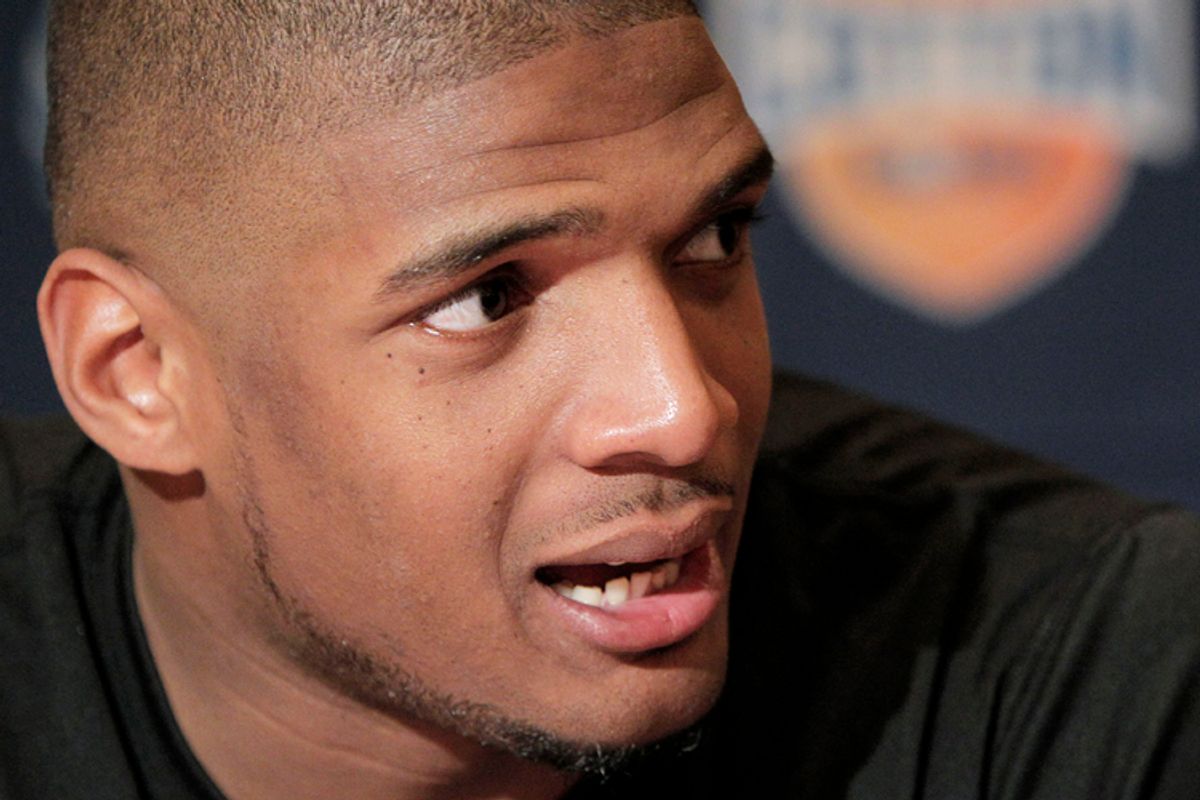Shortly after Michael Sam came out in interviews with the New York Times and ESPN, the NFL released a statement applauding the University of Missouri defensive end for his "honesty and courage," and the sentiment was echoed by a number of prominent players, coaches and league executives.
But a piece in Sports Illustrated on the "insider talk" about the impact that Sam's coming out will have on his career prospects painted a much different image of the current state of the NFL. Anonymous statements from league personnel coupled with allegations that the NFL had been vetting Sam for his sexuality over the last several months raise important questions about the subtle, silent operations of homophobia in professional sports.
This time last year, the NFL was in legal trouble once again for allegedly interviewing young prospects about their sexuality. At the time, NFL team officials were alleged to have asked players -- including San Diego Chargers linebacker Manti Te'o and Oakland Raiders tightend Nick Kasa -- whether or not they "like girls" during the NFL combine.
Te'o denied the questions, but Kasa told ESPN radio last year that he was asked by league officials, "Do you have a girlfriend? Are you married? Do you like girls?"
The NFL denounced the alleged questions with a statement pointing to its own charter and other laws that prohibit such inquiries. "Like all employers, our teams are expected to follow applicable federal, state and local employment laws," it said. "In addition, there are specific protections in our collective bargaining agreement with the players that prohibit discrimination against any player, including on the basis of sexual orientation."
As Avi Sinensky points out at the Huffington Post, anti-LGBTQ discrimination in hiring practices and in the workplace vary depending on where you are in the country. The Employment Non-Discrimination Act, which would codify such protections in federal law, has gained traction in recent months, but remains in legislative limbo.
There are currently 21 states (plus the District of Columbia) with laws that protect against sexual orientation discrimination in employment; and 27 of the 32 NFL teams fall within the jurisdiction of a state or city with such a law in place.
Following Kasa's allegations of illegal questioning, the NFL launched an investigation into the matter, but concluded a few months later that there were no "specific violations" of applicable laws or league rules during the combine. And yet, here we are again, barely a year later, with the same allegations surfacing. Which speaks to a cultural problem among the NFL gatekeepers that still needs to be addressed.
From Sports Illustrated:
Sam's announcement did not come as a surprise to most NFL teams. Sam's sexual orientation was considered an open secret in his college town of Columbia, Mo., and the assistant personnel man said he believed "90 percent of teams" were already aware that Sam was gay and had dropped him on their draft boards. He estimated that of the 32 NFL franchises, only two or three didn't know prior to Sunday night's news. He projected that it will impact Sam's draft status "quite a bit."
These allegations aren't happening in a vacuum. The NFL is regularly plagued by stories of terrible homophobia, from players, coaches, and league executives.
Jonathan Martin left the Miami Dolphins in October after alleged harassment from his teammates over his perceived "softness." He says the harassment -- both physical and verbal -- included a heavy dose of anti-gay slurs. In January, former Minnesota Vikings punter Chris Kluwe detailed the anti-LGBTQ sentiment among NFL personnel, and said that he believed his pro-LGBTQ advocacy is the reason he lost his job.
By most accounts, the NFL is not a safe space to be supportive of LGTBQ rights or to be suspected of being gay. In this environment, the subtle operations of alleged homophobia in the NFL's drafting process may carry more weight than happy press statements applauding Sam for his courage.
Sam is courageous, and his willingness to speak out has changed this for the better. His acceptance into the league as its first out gay player would be historic -- and a significant step forward.
But the reality is that Sam will need institutional and structural support within the league to succeed as a player. And the norms within the league will have to change to make room for others to follow Sam's lead and speak openly and publicly about who they are. The public statements of support -- and advocates and allies within the league -- will certainly help, but it's evident that much more is needed.
He should expect -- and deserves -- to have others in the NFL matching his courage by working for change. That's going to take more than a press release or congratulatory tweets.

Shares